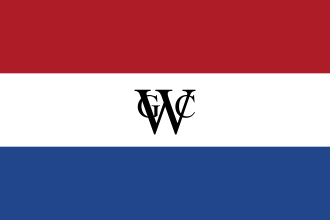Demerara
Demerara is a historical region in the Guianas on the north coast of South America which is now part of Guyana. Demerara was named after the Demerara River which flows through the region. The area was originally settled by the Dutch in the 17th century before coming under British control in the late 18th century. The economy of Demerara was heavily based on sugar cane cultivation, which was worked by enslaved Africans until the abolition of slavery in the British Empire in 1834. Following abolition, labor was supplemented by indentured workers from India, shaping the demographic and cultural landscape of the region.
History
The name "Demerara" comes from an indigenous word meaning "river of the letter wood". The Dutch established the colony of Demerara in the mid-17th century as part of their larger colonization efforts in the Guianas. The region was ceded to the British in 1814 under the Treaty of London, becoming a part of British Guiana, which later gained independence in 1966 as the modern nation of Guyana.
During the colonial period, Demerara grew to become a major sugar producer. The sugar cane industry shaped the region's economy and society, leading to the establishment of large plantations. The labor force initially consisted of enslaved Africans, and after the abolition of slavery, indentured laborers from India were brought to work on the sugar plantations. This history of forced labor and migration has had a lasting impact on the demographic and cultural composition of Guyana.
Geography
Demerara is located in the northern part of South America, bordered by the Atlantic Ocean to the north, the Demerara River to the east, and the Essequibo River to the west. The region is characterized by its fertile coastal plains which are ideal for sugar cane cultivation. The capital of Guyana, Georgetown, is situated in Demerara, serving as the country's political and economic center.
Economy
The economy of Demerara has historically been dominated by the sugar industry. Sugar production played a crucial role in the region's development and was the backbone of the economy for several centuries. In recent years, the economy has diversified, with sectors such as rice cultivation, mining (including bauxite and gold), and timber gaining importance. However, sugar remains a significant part of the economy and cultural identity of the region.
Culture
The culture of Demerara is a reflection of its diverse history, with influences from the indigenous peoples, Africans, Indians, Europeans, and other groups who have inhabited the region. This multicultural heritage is evident in the region's cuisine, music, festivals, and languages. English is the official language, but languages such as Guyanese Creole, Hindi, and others are also spoken.
Demerara Sugar
Demerara sugar, named after the region, is a type of raw sugar with a large grain and a pale amber color. It is known for its crunchy texture and caramel flavor, making it a popular topping for baked goods and a sweetener for beverages. The production of Demerara sugar is one of the enduring legacies of the region's sugar cane industry.
Transform your life with W8MD's budget GLP-1 injections from $125.
W8MD offers a medical weight loss program to lose weight in Philadelphia. Our physician-supervised medical weight loss provides:
- Most insurances accepted or discounted self-pay rates. We will obtain insurance prior authorizations if needed.
- Generic GLP1 weight loss injections from $125 for the starting dose.
- Also offer prescription weight loss medications including Phentermine, Qsymia, Diethylpropion, Contrave etc.
NYC weight loss doctor appointments
Start your NYC weight loss journey today at our NYC medical weight loss and Philadelphia medical weight loss clinics.
- Call 718-946-5500 to lose weight in NYC or for medical weight loss in Philadelphia 215-676-2334.
- Tags:NYC medical weight loss, Philadelphia lose weight Zepbound NYC, Budget GLP1 weight loss injections, Wegovy Philadelphia, Wegovy NYC, Philadelphia medical weight loss, Brookly weight loss and Wegovy NYC
|
WikiMD's Wellness Encyclopedia |
| Let Food Be Thy Medicine Medicine Thy Food - Hippocrates |
Medical Disclaimer: WikiMD is not a substitute for professional medical advice. The information on WikiMD is provided as an information resource only, may be incorrect, outdated or misleading, and is not to be used or relied on for any diagnostic or treatment purposes. Please consult your health care provider before making any healthcare decisions or for guidance about a specific medical condition. WikiMD expressly disclaims responsibility, and shall have no liability, for any damages, loss, injury, or liability whatsoever suffered as a result of your reliance on the information contained in this site. By visiting this site you agree to the foregoing terms and conditions, which may from time to time be changed or supplemented by WikiMD. If you do not agree to the foregoing terms and conditions, you should not enter or use this site. See full disclaimer.
Credits:Most images are courtesy of Wikimedia commons, and templates, categories Wikipedia, licensed under CC BY SA or similar.
Contributors: Prab R. Tumpati, MD



